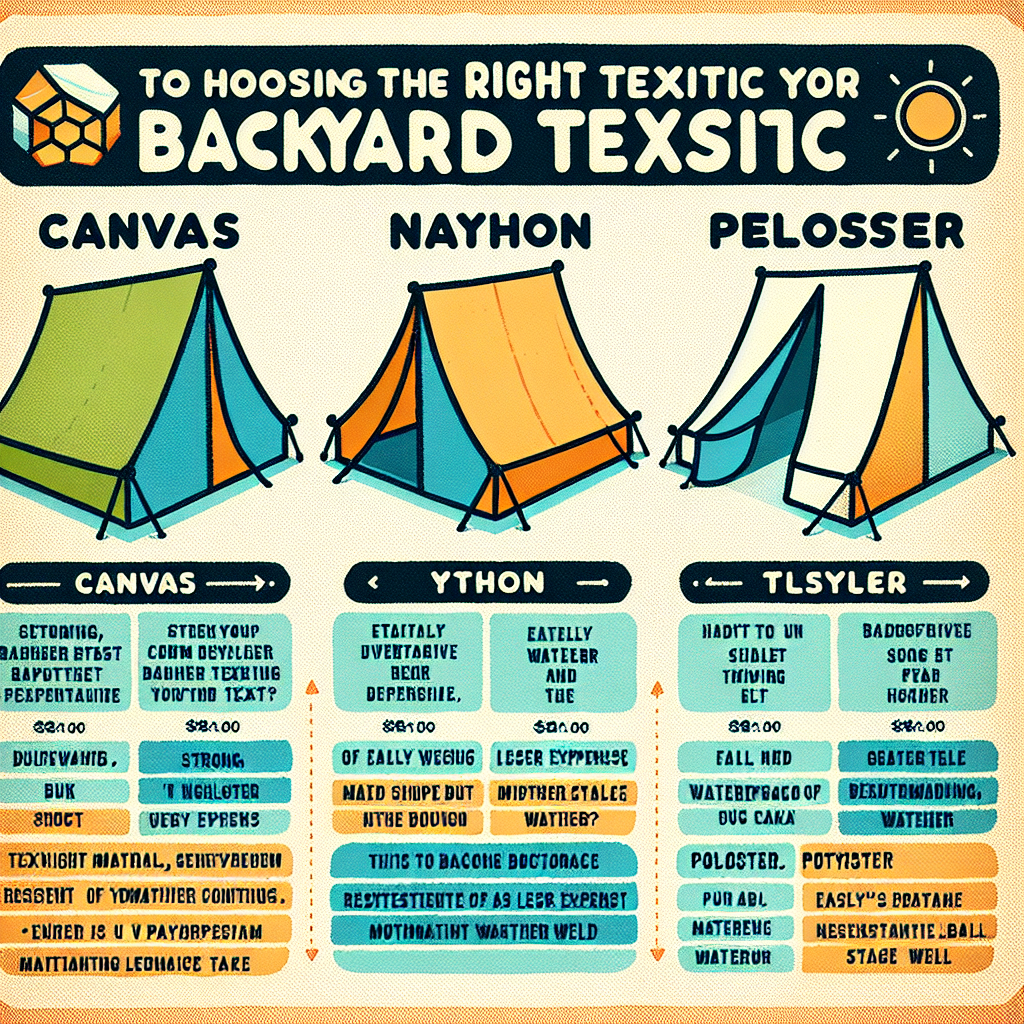Choosing the Best Textile for Your Backyard Tent
Introduction
Selecting the right textile for your backyard tent is crucial. The fabric you choose affects both durability and comfort. Whether you're hosting a weekend camping event or setting up a relaxing outdoor space, understanding your textile options can significantly enhance your experience.
Types of Tent Textiles
Canvas
Canvas is a classic choice for tents, known for its strength and breathability. One major advantage of canvas is its durability; it can withstand harsh weather conditions, making it ideal for long-term setups. However, canvas tents tend to be heavier and more expensive. They offer excellent insulation, keeping the tent warm in cold weather and cool during hot days. For campers who enjoy a more traditional feel and want a tent that stands the test of time, canvas might be the perfect option.
Nylon
Nylon tents are popular for their lightweight nature. They are easy to transport and quick to set up, which suits camping adventures that require frequent movement. Nylon is also less expensive compared to canvas, but it may not provide the same level of durability. It tears more easily and requires care to maintain its condition over time. In rainy climates, look for nylon tents with additional waterproof coatings to prevent leakage.
Polyester
Polyester tents offer a balanced option between weight and durability. Polyester is resistant to UV damage, making it a smart choice for sunny environments. These tents maintain their shape well when exposed to moisture, preventing sagging and stretching. While not as heavy-duty as canvas, polyester tends to last longer than nylon under similar conditions. These tents are great for casual campers who set up in consistent weather patterns.
Key Factors to Consider When Choosing Tent Textiles
Weather Resistance
Weather resistance is vital. Opt for textiles that offer waterproof capabilities and UV protection. This feature prolongs the tent’s lifespan and ensures user comfort. Different climates demand different levels of weather resistance. For instance, if you camp often in sunny locales, UV-resistant fabric will protect against sun damage, while waterproof features are more essential in rainy regions.
Breathability
Breathability directly affects comfort inside the tent. Textiles with good ventilation help regulate temperature and reduce condensation. Canvas provides excellent breathability but can be heavier. Nylon might need additional ventilation features, such as mesh windows, to enhance airflow. The choice should align with the climate and your personal comfort needs.
Weight
The weight of your tent's textile plays a significant role in transportation and setup. Canvas, while durable, is heavy, making it less convenient for those who frequently change camping spots. Nylon and polyester are lighter and better suited for mobile applications. Compare the weight of textiles and consider how it impacts your camping style and ease of setup.
Textile Maintenance and Care
Maintaining your tent is essential for longevity. Cleaning methods vary depending on the textile. For canvas, regular brushing and spot cleaning with mild soap will suffice. Nylon and polyester can be wiped clean with a damp cloth. Always ensure your tent is completely dry before storage to prevent mold growth. Proper storage and folding techniques ensure that the material remains intact, prolonging the life of your tent.
Cost vs. Value
Understanding the cost versus value of each textile is crucial. Canvas may have a higher initial cost but offers lasting value through its durability. Nylon is more budget-friendly upfront yet may require frequent replacement. Weigh the long-term benefits against initial spending to determine the right balance for your needs.
Popular Brands and Their Textile Offerings
Notable brands specialize in a range of tent textiles. Some offer innovations like enhanced waterproof coatings or advanced UV protection. Brand reputations vary based on consumer feedback about quality and fabric performance. Researching established brands will guide you to a product that meets your expectations.
Consumer Reviews and Experiences
Customer feedback reveals much about textile choices. Reviews highlight pros and cons based on usage, such as fabric longevity or comfort level. Common issues include nylon's susceptibility to tearing or canvas's weight concerns, but praises often focus on a tent's ability to withstand various conditions. Such insights can help refine your decision.
Conclusion
Choosing the best textile for your backyard tent involves balancing several factors. Durability, comfort, and costs all play into making an informed choice. Matching the fabric's strengths with your camping needs ensures the best experience, whether you're aiming for long-lasting use or lightweight convenience.
FAQs
What is the most durable tent fabric?
Canvas is the most durable, offering superior strength and weather resistance.
How do I clean my nylon tent?
Use a damp cloth to wipe down the nylon surface, ensuring it dries fully before storage.
Can I find UV-resistant tent fabrics?
Yes, both polyester and some nylon options include UV-resistant features to protect against sun damage.

